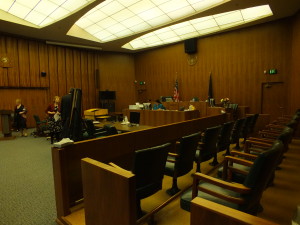
Closing arguments are scheduled for Tuesday morning in U.S. District Court in Juneau in the case of a Wrangell doctor accused of downloading, possessing, and distributing child pornography. Then, the case against Greg Alan Salard will be in the hands of a jury.
The prosecution presented the last of their witnesses and rested their case on Monday.
Salard’s defense team did not put on a defense. They did not offer any witnesses or present any evidence of their own, and Salard declined to testify on his own behalf.
Earlier on Monday, FBI Special Agent Anthony Peterson retook the witness stand so Assistant Federal Public Defender Cara McNamara could resume her cross examination from Thursday. Peterson testified that he did not see any evidence of a virus or malware, or a remote access program that could allow someone to deposit files on Salard’s computer without his knowledge.
But Peterson said his “thumbdrive became corrupted and (he) lost everything on it.” The thumbdrive contained a report that was generated after Peterson used a forensic program to examine a hard drive from Salard’s laptop.
Juneau-based FBI Special Agent Matthew Judy testified he drove by Salard’s house at least three times the morning of Oct. 15, 2014, to determine who was there before arriving with other officers to execute a search warrant. Judy also noted that 8 minutes passed between the time they arrived and when Salard finally came down the stairs in his robe to open the door. Prosecutors believe that during that 8 minutes Salard started running a program that could destroy evidence of child porn on his laptop. Peterson testified that he stopped the program after it had partially wiped the hard drive.
After the prosecution rested its case, defense attorney Dan Poulson moved for acquittal on the possession charge and referred to court precedent regarding a file that had been deleted from a computer hard drive. Even when a video has been deleted, traces remain in so-called “unallocated space” until it’s been written over or the drive has been wiped clean. Higher courts have ruled that just presenting images stored in unallocated space is not enough to establish knowing possession. More evidence has to be presented to demonstrate a defendant’s knowledge of the files and their control of the computer.
Poulson also noted that there was no date or time listed for the alleged playback of the most recently played video on Windows Media Player, nor was there a specified hash value that could definitively link Salard to playback of a specific video. A hash value is a unique, traceable digital fingerprint for a file.
U.S. District Court Judge Tim Burgess, however, determined there was sufficient evidence for the return of a guilty verdict on the possession charge. He noted that Peterson — through another computer at the Wrangell Police Department — saw Salard offer the same video through the Ares peer-to-peer sharing program. An examination of the program’s history data on Salard’s laptop also revealed that the video was one of 83 child pornography files and 525 files of other pornography that Salard had downloaded.
Jury deliberations begin after closing arguments Tuesday morning.
